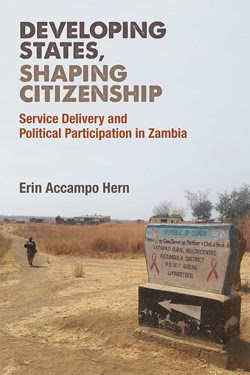full-time faculty teaching and conducting research in political science
of Maxwell faculty conduct research focused outside of the U.S.
graduate students in residence; fewer than 12 admitted each year
Undergraduate Studies
Graduate Studies

I am Maxwell.
Civic engagement is a core value for me. I have always aspired to help the communities I’m from.” Mazaher Kaila, a Maxwell alumna and third-year student at Syracuse University's College of Law, moved with her family from Sudan to Central New York when she was four years old. “I realized that to make meaningful change in society, I needed to understand the systems that power it—government and politics—and that’s insight I would gain by studying political science.”
Mazaher Kaila ’19, L’22
political science, law
Developing States, Shaping Citizenship: Service Delivery and Political Participation in Zambia
Erin Hern
University of Michigan Press, December 2019

At the nexus of political science, development studies, and public policy, "Developing States, Shaping Citizenship" analyzes an overlooked driver of political behavior: citizens’ past experience with the government through service provision. Using evidence from Zambia, this book demonstrates that the quality of citizens’ interactions with the government through service provision sends them important signals about what they can hope to gain from political action.
These interactions influence not only formal political behaviors like voting, but also collective behavior, political engagement, and subversive behaviors like tax evasion. Lack of capacity for service delivery not only undermines economic growth and human development, but also citizens’ confidence in the responsiveness of the political system. Absent this confidence, citizens are much less likely to participate in democratic processes, express their preferences, or comply with state revenue collection.
Economic development and political development in low-capacity states, Assistant Professor Erin Hern argues, are concurrent processes. Hern draws on original data from an original large-N survey, interviews, Afrobarometer data, and archival materials collected over 12 months in Zambia.
The theory underlying this book’s framework is that of policy feedback, which argues that policies, once in place, influence the subsequent political participation of the affected population. This theory has predominantly been applied to advanced industrial democracies, and this book is the first explicit effort to adapt the theory to the developing country context.
Related News
Research

Jul 15, 2024
Commentary

Jul 10, 2024
Commentary

Jul 8, 2024
Research

May 23, 2024
BaoBao Zhang Joins First Cohort of AI2050 Early Career Fellows
One of only 15 scholars chosen from across the U.S., Zhang will receive up to $200,000 in research funding over the next two years. Zhang will use the funding to partner with the nonprofit, non-partisan Center for New Democratic Processes to test whether public participation in AI governance is increased through the creation of public assemblies, known as “deliberative democracy workshops.”
Baobao Zhang
Assistant Professor, Political Science Department

Developing States, Shaping Citizenship: Service Delivery and Political Participation in Zambia
Erin Hern
University of Michigan Press, December 2019

At the nexus of political science, development studies, and public policy, "Developing States, Shaping Citizenship" analyzes an overlooked driver of political behavior: citizens’ past experience with the government through service provision. Using evidence from Zambia, this book demonstrates that the quality of citizens’ interactions with the government through service provision sends them important signals about what they can hope to gain from political action.
These interactions influence not only formal political behaviors like voting, but also collective behavior, political engagement, and subversive behaviors like tax evasion. Lack of capacity for service delivery not only undermines economic growth and human development, but also citizens’ confidence in the responsiveness of the political system. Absent this confidence, citizens are much less likely to participate in democratic processes, express their preferences, or comply with state revenue collection.
Economic development and political development in low-capacity states, Assistant Professor Erin Hern argues, are concurrent processes. Hern draws on original data from an original large-N survey, interviews, Afrobarometer data, and archival materials collected over 12 months in Zambia.
The theory underlying this book’s framework is that of policy feedback, which argues that policies, once in place, influence the subsequent political participation of the affected population. This theory has predominantly been applied to advanced industrial democracies, and this book is the first explicit effort to adapt the theory to the developing country context.
Related News
Research

Jul 15, 2024
Commentary

Jul 10, 2024
Commentary

Jul 8, 2024
Research

May 23, 2024